
Reducing Downtime by 40% with an Intelligent Vehicle Fleet Management System
Our Client
Our client is a fast-growing logistics and transportation company operating across multiple regions, managing a large and expanding fleet of delivery and service vehicles. As their operations scaled, the need for an intelligent and responsive fleet management system (FMS) became paramount. Their existing infrastructure could no longer support the complexities of real-time vehicle tracking, health monitoring, and operational analytics. To address these pain points, the client approached AgileTech with a clear vision: develop a robust and scalable vehicle tracking and fleet management system that integrates cutting-edge GPS fleet management system features with cloud-based scalability.
Web Features
The delivered web-based platform was tailored to optimize the fleet management lifecycle. Its core features included:
- Real-Time GPS Vehicle Tracking: Comprehensive mapping tools with live location updates, route playback, and geofencing capabilities.
- Vehicle Health Monitoring via IoT Sensors: Integration with onboard diagnostics (OBD) systems and sensors to monitor key performance indicators such as engine health, tire pressure, fuel consumption, and battery levels.
- Automated Maintenance Notifications: Customizable alerts and schedules to notify fleet managers and drivers of upcoming or overdue services.
- Data Analytics and Reporting: Detailed reporting dashboards for trip history, driving behavior analysis, maintenance logs, and fuel efficiency metrics.
- Mobile Accessibility: The system supports seamless access on both desktop and mobile devices, ensuring field operatives and administrators can manage operations anytime, anywhere.
- Role-Based Access Control: Admins can define roles and permissions, ensuring secure access to data and system modules.
Project Goals
The primary goal was to create an all-in-one, cloud-based vehicle fleet management system capable of supporting thousands of vehicles with high data accuracy and real-time communication. Beyond tracking, the platform was envisioned to deliver actionable insights to improve fleet efficiency, reduce operational costs, and enhance safety. Scalability, real-time responsiveness, and cross-platform access were central to the system’s architecture.
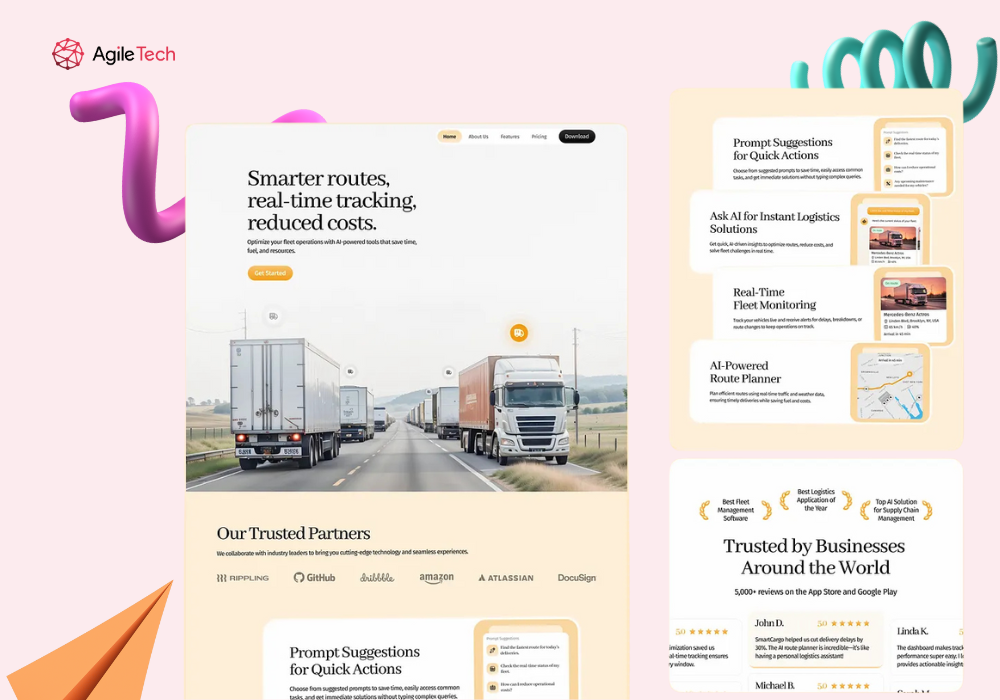
Challenges
Developing a high-performance vehicle fleet management system for a large-scale operation presented a complex mix of technical and logistical challenges. From the outset, it was clear that the success of the project hinged on our ability to manage and process a massive amount of real-time data reliably, while also delivering a smooth, responsive user experience across devices. The following core challenges emerged during the discovery and planning phases:
1. Real-Time Telematics Data Processing at Scale
The backbone of any GPS fleet management system is the ability to collect and process telematics data from a vast network of vehicles in real time. Each vehicle in the client’s fleet was equipped with IoT devices transmitting multiple data points per second, including location, speed, engine diagnostics, fuel levels, and driver behavior indicators. This created a constant stream of high-volume, time-sensitive data that needed to be ingested, processed, stored, and visualized without delay.
The challenge was twofold: not only did the system need to handle real-time data processing, but it also needed to ensure data integrity and consistency across all dashboards and reports. Any latency or data loss could compromise decision-making, driver safety, and fleet performance.
2. Ensuring Scalable Architecture for Fleet Growth
The client’s fleet was growing rapidly, with plans to onboard hundreds of new vehicles and expand operations to new regions within the following year. This meant the system architecture had to be future-proof from the beginning. A short-term solution that merely accommodated the current fleet size would have been inadequate and risky.
We had to anticipate increasing data loads, user traffic, and integration points while ensuring the system remained stable and responsive. The platform needed to support horizontal scalability—allowing the client to add new vehicles, devices, users, and locations without impacting overall performance or requiring major reengineering.
3. Maintaining Reliable, Low-Latency Communication Between Devices and the Cloud
One of the critical performance metrics for any fleet management system (FMS) is how quickly and reliably data can travel from a moving vehicle to the cloud, and then from the cloud to the end-user interface. Factors such as unstable network connections, limited bandwidth in remote areas, and hardware inconsistencies can all disrupt this flow of information.
To meet the client’s needs, it was essential to design a system that could maintain reliable communication in real time—even in environments where connectivity is limited or inconsistent. This included not only the telemetry data, but also the delivery of commands and notifications back to the fleet (such as maintenance alerts, safety warnings, or dispatch messages). Delays or missed transmissions would undermine the platform’s core purpose.
4. Integrating and Standardizing IoT Sensor Data from Multiple Vendors
The client utilized a variety of IoT devices sourced from different hardware providers. Each had its own communication protocol, data format, and level of compatibility. Integrating these into a unified data model that could power a consistent user experience was an added layer of complexity.
We needed to normalize this heterogeneous data, standardize it across modules, and ensure the system could continue to onboard new types of devices in the future without requiring significant redevelopment.
5. Delivering a Mobile-Accessible, User-Friendly Interface
The platform would be used by a wide range of stakeholders—including fleet managers, dispatchers, mechanics, and drivers—many of whom would rely on mobile devices while in the field. It was crucial that the interface was not only responsive across devices, but also intuitive enough for quick adoption by non-technical users.
Designing for usability while maintaining depth of functionality was a careful balancing act. The user interface had to present complex analytics and real-time data in a way that was digestible and actionable—even when accessed on a smartphone with limited screen space.
AgileTech’s Solutions
To address the challenges of building a scalable, real-time vehicle tracking and fleet management system, AgileTech delivered a tailored, cloud-first solution with a focus on performance, flexibility, and usability.
1. Real-Time Data Handling:
We implemented a robust AWS IoT architecture capable of processing high-volume telematics data from multiple vehicles and IoT sensors. This ensured real-time tracking, accurate health monitoring, and seamless data flow with minimal latency.
2. Scalable Cloud Infrastructure:
The system was built to scale horizontally, allowing easy onboarding of new vehicles, users, and regions. The cloud-native setup ensures the platform remains stable and responsive as the fleet grows.
3. Low-Latency Communication:
Using optimized communication protocols and cloud services, we ensured reliable, two-way communication between vehicles and the platform—even in areas with poor connectivity. Alerts, commands, and data updates now transmit in real time.
4. Flexible IoT Integration:
We developed a unified data model that normalized inputs from various IoT devices and vendors. This made the system hardware-agnostic and easy to extend, reducing future integration efforts.
5. Mobile-Responsive and User-Friendly Design:
The frontend, built with Angular, delivers a responsive UI that works seamlessly across desktops and mobile devices. Key features are easily accessible, ensuring both drivers and managers can operate the system efficiently from anywhere.
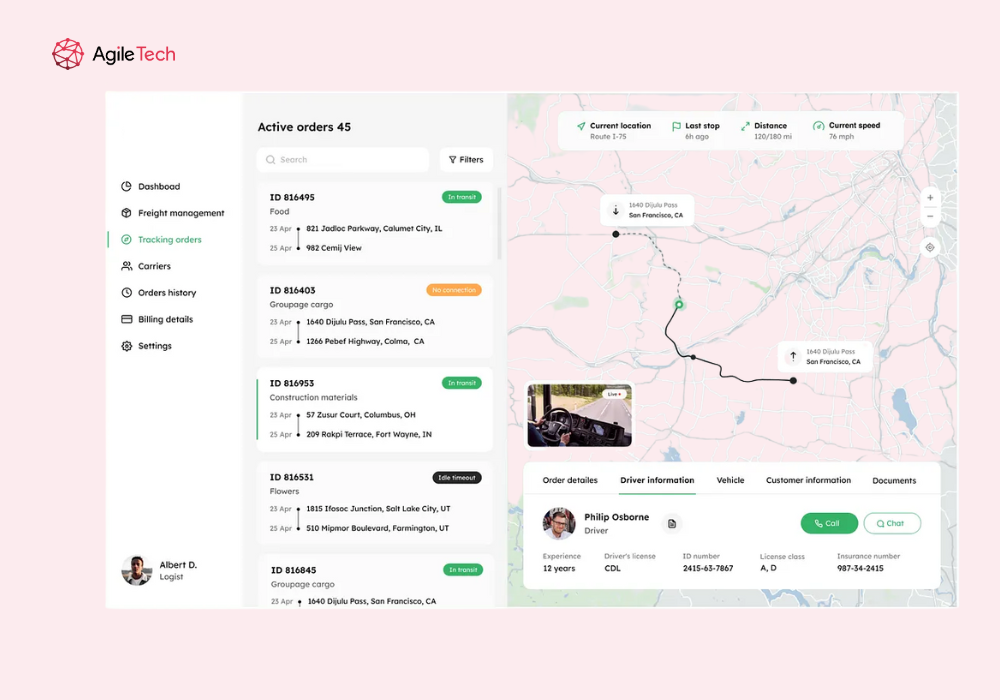
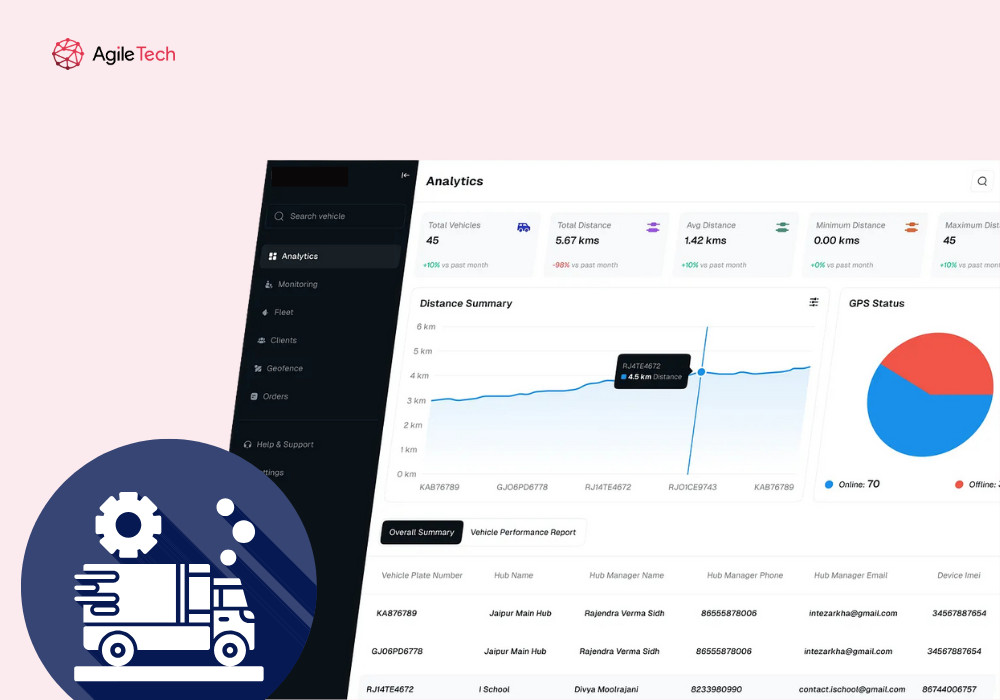
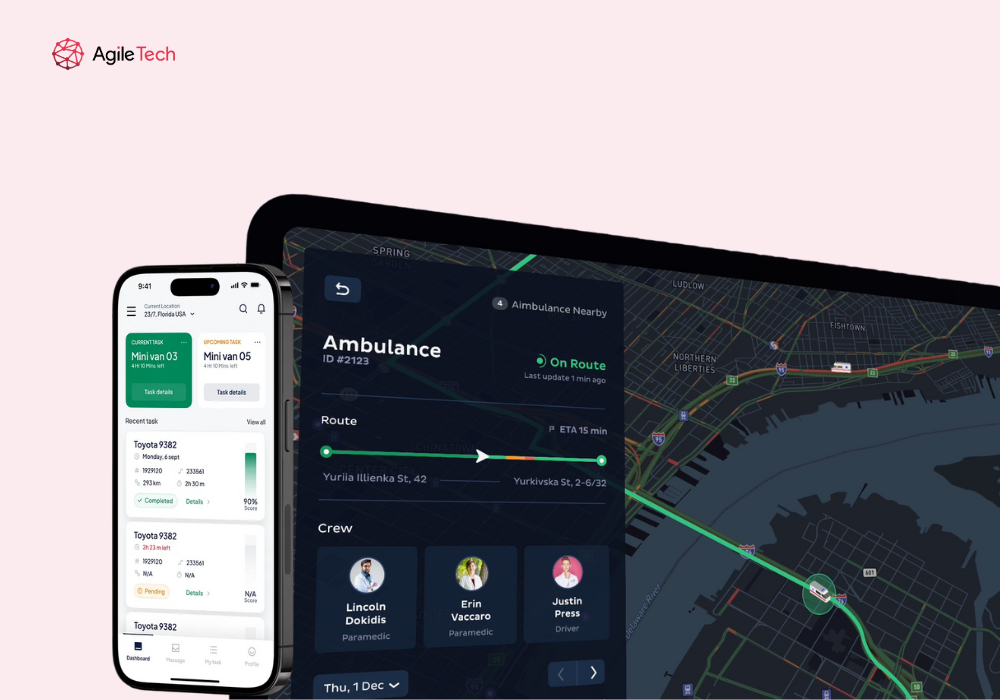
Related Post: A GPS Fleet Management System Improved Petroleum Truck Tracking by 65%
Technologies Used
The project’s tech stack was carefully selected to deliver maximum performance and adaptability:
- Frontend: Angular – for fast, responsive, and user-friendly interfaces.
- Backend: PHP with Symfony – providing a secure, flexible framework for handling complex business logic.
- Database: PostgreSQL – used for its robustness in handling large volumes of structured data.
- Cloud Infrastructure: AWS IoT and supporting services – to facilitate scalable real-time data ingestion, storage, and analysis.
Project Results
The result was a fully functional and scalable GPS fleet management system that significantly streamlined the client’s operations. Key improvements included:
- A 40% increase in operational visibility thanks to real-time vehicle tracking and reporting.
- 30% reduction in vehicle downtime due to automated maintenance alerts and proactive repairs.
- Enhanced driver accountability and safety due to behavior analytics and geofencing features.
- The platform seamlessly supported the client’s growing fleet with zero disruption during scaling phases.
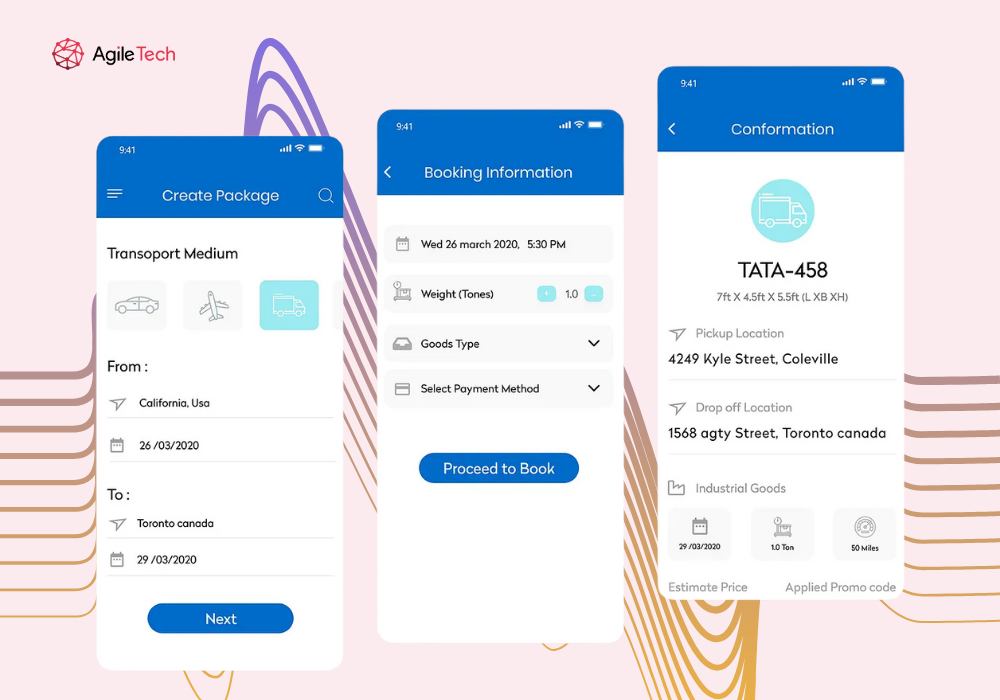
Moreover, the web-based vehicle tracking and fleet management system empowered managers with the tools needed to make informed decisions and optimize their fleets like never before.
Project Highlights
One of the most notable achievements of the project was delivering a cost-effective solution without compromising on performance or reliability. AgileTech completed the system within the estimated production time, ensuring a smooth rollout across all operational regions.
The client was highly satisfied with the outcome and appreciated AgileTech’s consultative approach and transparent communication throughout the development cycle. Due to the project’s success, our partnership continues beyond the initial deployment.
As of December 2022, AgileTech is collaborating with the client to implement advanced billing features integrated with their internal accounting system. This new module automates invoice generation and supports online payments via credit cards and bank transfers—bringing the system closer to being an end-to-end fleet management hub.
Post-Launch Support
Post-launch, AgileTech remains actively engaged in the platform’s evolution. Our support team provides:
- 24/7 system monitoring and performance tuning
- Regular updates and security patches
- Custom module development based on evolving business needs
- User training and documentation updates
With continuous enhancements and responsive technical support, the client has the confidence to scale further and explore new service territories.
Project Images
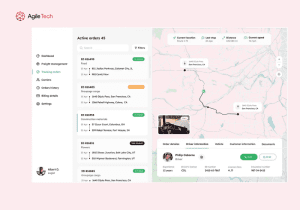
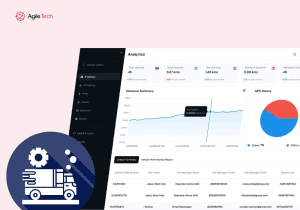
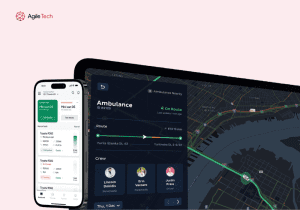
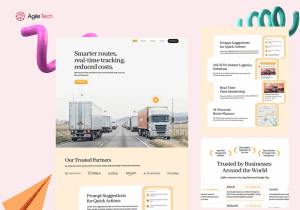
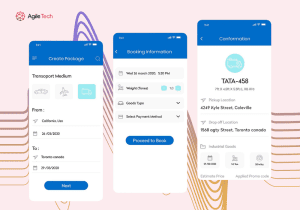
Looking to build your own vehicle fleet management system ?
Consult Industry Specialists
Connect with us today to discuss your software development needs and discover how our tailored outsourcing services can propel your business forward.